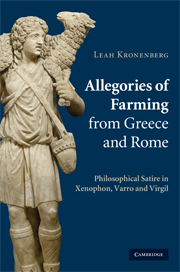Book contents
2 - A philosopher and a gentleman (Oec. 7–21)
from PART I - XENOPHON'S OECONOMICUS
Published online by Cambridge University Press: 03 May 2010
Summary
Socrates begins his dialogue with Ischomachus when he finds him “at leisure” (σχολάζειν, 7.1) in the Stoa of Zeus Eleutherius waiting for some guests in the agora (7.1–2). This setting sets out the key themes of the ensuing dialogue, and they are themes that for the most part recapitulate those in the dialogue with Critobulus: Ischomachus' state of leisure, which elicits surprise from Socrates (7.1), activates the contrast between the active and contemplative life since Ischomachus, the “active man,” is now at leisure, while Socrates, the “contemplative man,” is actively seeking knowledge. Ischomachus' placement in the Stoa of Zeus Eleutherius, in the heart of the agora, connects him to conventional Athenian life and values. The epithet of Zeus “Eleutherius” introduces the concept of freedom and its opposition to slavery, while the circumstances of his gaining the epithet, i.e. Athens' victory over Persia, emphasizes the opposition between the barbarian empire and the Athenian democracy. Finally, the Stoa was also a picture gallery and, as Pausanias relates (1.3–4), contained paintings of the twelve gods, Theseus, Democracy, Demos, the Battle of Mantinea, and a cavalry battle with Xenophon's son Gryllus. Thus, as a venue for beautiful paintings of noble deeds and concepts, the Stoa also connects to the dichotomy of appearance and reality. All of these dichotomies are explored and reconceptualized in the course of the dialogue as Socrates probes beneath the surface of conventional virtue and the art of ruling.
- Type
- Chapter
- Information
- Allegories of Farming from Greece and RomePhilosophical Satire in Xenophon, Varro, and Virgil, pp. 54 - 72Publisher: Cambridge University PressPrint publication year: 2009



